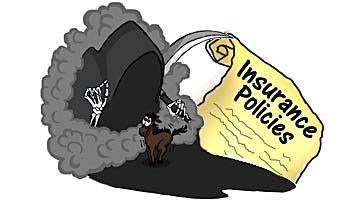Outside the Box: Insurance Policies
July 21, 2008,by Bob Carson
Editor’s Note: The USTA Web site is pleased to present freelance writer Bob Carson and his popular “Outside the Box” features. This monthly series is a menu of outlandish proposals presented with a wink — but the purpose behind them is serious.
“To cultivate kindness is a valuable part of the business of life.” — Dr. Samuel Johnson

Bob Carson
Behind every horse purchase, lurking in the shadows like a hunched figure in a shadowy corner, is the question of what happens to this horse at the end of its racing days. For many, both in the grandstand and in the sales ring, the issue of non-viable racehorses is an albatross. The future of unwanted horses or unproductive horses casts a longer shadow than we can quantifiably measure.
Many of us acquire a horse and our first thoughts are, “This beautiful horse might be a champion.” An instant later, many of us wince as we consider, “Some day I will need to make a decision on the future of this horse.” That second thought has prevented me, and countless others, from nodding our heads more often in the auction arena.
We are several generations removed from an agrarian culture where disposal of animals was routine. Agribusiness has, for the most part, removed slaughter and mistreatment from our sight. The debate on whether the life and care of a horse is more important than a cow, or a chicken, or a pig will not be decided here. One thing that cannot be debated is that for some of us — owners, trainers and fans, we form a deep attachment to our horses.
Let’s put emotion aside and talk economics, both as a problem and potential solution.
Ask any owner or trainer about the fiscal wisdom of keeping a barn full of racehorses that are more horse than race.
“Slow horses will kill you.”
“If they don’t make money, they are gone, period.”
“I don’t have time to wait or waste on a horse that does not show a profit.”
”I’m a business person. In this business, they go or I go.”

Autumn Schmidt graphic
Where they go is a problem. Harness race people, by nature, are horse lovers. The conundrum is you must continue to turn over stock or you will eventually wind up with a stable full of pets. It is very easy to buy a horse. It is fun to watch a yearling train and hopefully race. It is very hard for many of us to let a horse go. Without a doubt, one reason some folks do not buy horses is the fear, like a dark cloud gathering on the horizon, of what happens at the end of the trail.
If you are an individual owner you have control, you can mitigate the post race days by having a good home waiting or personally finding a good home. If you are in a partnership or syndicate the post racing future of the horse is dicier.
Here is a proposal for the ocean of potential horse fans that are unable or unwilling to participate in the harness racing game due to the unpredictable future of their four-legged friends.
Suppose you are going to set up a syndicate to buy a yearling. Or suppose you are a trainer pitching to a new owner. In your projections you will give the potential owner a list of expenses; the usual suspects, training, staking, paddock fees, immunizations, vet work, equipment, transportation, etc. At the end of this itemized list is a new expense, life insurance.
What! Another expense.
Yes, and one that might mean the difference between a thumbs up and a thumbs down to some investors.
The life insurance clause is simply this — the syndicate owner will be responsible for the life of the horse after the racing days. The owner will pay a share until a good home is found. The new clause in the syndicate guidelines does not have to be set in stone. It can’t be, because some horses go on to be stars as studs and broodmares, some are productive for many years, and some don’t last more than a few months. Should a syndicated horse get claimed, this could get a bit tricky; perhaps agree to forego claimers or claim it right back or keep tabs until the race days are over.
The costs of boarding a horse turned out at a farm while looking for a good home should not be prohibitive, especially when spread among a syndicate. The cost to our sport of the looming specter of racehorses being mistreated after their career is incalculable. The rewards for fans and owners in feeling secure that the horse they purchase will have a long and happy life would be beyond measure.
